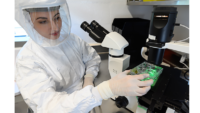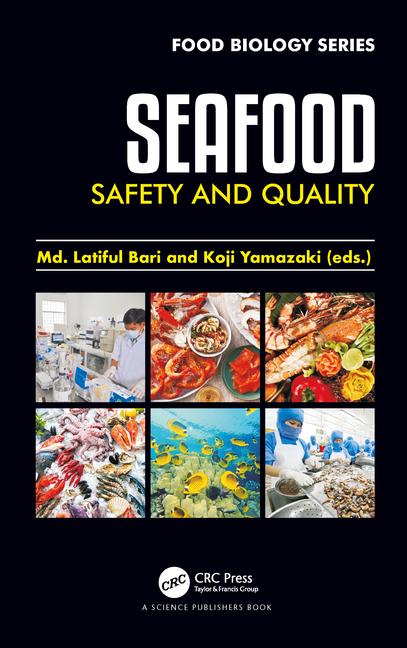Unmasking Food-safety Threats
By Allison Bardic, Senior Editor
Fast and accurate detection tests for meat and poultry hazards are essential tools, as food safety remains a major concern among consumers, processors, and government.
|
To keep pace with the food processing industry, researchers and suppliers spent years developing improved methods for the rapid detection and identification of pathogens. Most recently, the need to quickly identify food-safety threats was underscored by the discovery of a single BSE (bovine spongiform encephalopathy)-infected cow in Washington state, prompting the Agriculture Department (USDA) to greatly expand the number of cattle it will test for the infection — and to approve rapid tests for use in its enhanced BSE surveillance program, among other initiatives.
As part the plan, the first USDA-approved rapid tests for detecting BSE include Hercules, CA-based Bio-Rad Laboratories’ TeSeE® test, and Westbrook, ME-based IDEXX Laboratories’ IDEXX HerdChek® BSE Antigen Test Kit for use in the National Veterinary Service Laboratories (NVSL) in Ames, IA, and a network of laboratories around the country.
“We are pleased that our test has met the stringent requirements for the USDA qualification process,” says Brad Crutchfield, vice president of life science, Bio-Rad. “We are well prepared to provide the USDA with the same high level of support that our other customers receive.” Bio-Rad has extensive experience working with more than 500 labs in 25 countries around the world that screen for BSE.
“We are pleased that our test has met the stringent requirements for the USDA qualification process,” says Brad Crutchfield, vice president of life science, Bio-Rad. “We are well prepared to provide the USDA with the same high level of support that our other customers receive.” Bio-Rad has extensive experience working with more than 500 labs in 25 countries around the world that screen for BSE.
BSE Test Basics
Bio-Rad’s BSE test kit is an ELISA (Enzyme-Linked Immunosorbent Assay) detection technique, one commonly used for large-scale diagnostic screening for infectious agents or corresponding antibodies. The ELISA technique is used, for example, to track microbial and viral pathologies such as hepatitis, AIDS, or pathogens responsible for Listeria or Salmonella.
The method incorporates two stages. During the first stage, brain samples are purified; in the second stage, the purified samples are deposited for analysis into a 96-well microplate. The microplate is then subjected to a process which results in the low-level detection of the abnormal prion protein linked to BSE.
“The Bio-Rad BSE test kit produces results within four hours. It is known to be up to thirty times more sensitive than the second-most sensitive test on the market,” the company attests. “The Bio-Rad test has never produced a false negative.”
IDEXX’s HerdChek BSE Antigen Test Kit, meanwhile, is described as a second-generation BSE test that uses a novel prion capture technology licensed by the UK’s Microsens Biotechnologies. The technology is not an antibody, but a PRPsc-specific chemical ligand. The Microsens technology selectively binds PRPsc (rouge prions) in the presence of PRPc (normal prions) from a simple tissue and water homogenate, removing the need for complicated and potentially error-prone sample preparation.
“The removal of the proteinase K sample preparation process — which is required by all of the first-generation tests — is a revolutionary advance in BSE testing,” notes Nevena Novkovic, TSE marketing manager, IDEXX. “The combination of ease of use and performance for the IDEXX BSE test is unmatched.”
The postmortem HerdChek BSE Antigen Test Kit takes about four hours to complete and is easy to run manually with minimal requirements for lab equipment.
“Labs can easily run one-thousand samples per day with no requirements for automation due to the simplicity of the sample preparation process,” Novkovic adds. “For very high-volume applications or labs that wish to run automation, the test is very simple to automate.”
While Bio-Rad’s and IDEXX’s BSE tests currently are the only ones licensed for use in USDA’s testing program, they’re not alone among companies contributing to eliminating the threat of mad cow disease. Strategic Diagnostics Inc., a Newark, DE-based provider of antibody products and analytical test kits for the food safety and water quality markets, offers the FeedChek™ screening test for the detection of meat and bone meal in animal feeds, which is linked to the transmission of BSE. This simple, highly sensitive, field-based lateral flow test has a 15-second extraction process and a 10-minute assay time.
“Since contaminated meat and bone meal is thought to be the primary source of infection with BSE, mammalian meat and bone meal has been prohibited from use in cattle feeds,” notes Amy Jo McCardell, business manager, food safety, Strategic Diagnostics. “SDI’s FeedChek test kit is a fast, simple, and accurate way to test for contamination in feed.”
In the same vein, Lansing, MI-based Neogen Corp. has produced simple, on-site tests for the rapid detection of ruminant by-products in meat and bone meal, or in finished feed. The tests require only 10 minutes and the immersion of disposable test devices into sample preparations to produce easy-to-interpret visual results, notes John Simlar, marketing manager, food safety core products, Neogen.
Beyond BSE
While BSE testing has been making headlines, a vast array of rapid pathogen-detection tests play a critical role in meat and poultry processors’ operations. In addition to its FeedChek test kit for animal feed, Strategic Diagnostics offers rapid pathogen tests for Salmonella, E. coli O157:H7, and Listeria, for example.
Strategic Diagnostics’ RapidChek® lateral-flow tests are immunoassays that use a unique combination of anti-pathogen antibodies and colloidal gold coated on the surface of a membrane.
“To use our assays, a sample is placed into an enrichment broth and incubated. This incubation period is a short as eight hours for the E. coli O157 test, twenty-four hours for Salmonella, and forty hours for Listeria,” McCardell explains. “After enrichment, a small sample is transferred into the lateral-flow device. The liquid sample travels up the surface of the test strip via capillary action. If the target pathogen is present in the sample, a red line will form, indicating a positive result.
“SDI’s customers have observed fewer false positives with our tests, and have found the RapidChek tests to be simple, easy to use, and extremely easy to read,” she continues. “Our enrichment medias have superior resuscitation capabilities, which yield superior sensitivity and accuracy. SDI has also developed a special confirmation protocol for use with our RapidChek tests, which reduce material and labor costs and increase recovery.”
Neogen’s Reveal® test systems come with everything to complete a pathogen screen, including an enrichment medium. Reveal’s lateral-flow device combines an immunoassay with chromatography for a rapid and accurate one-step result. Results, in fact, are available 15 minutes after enrichment. “The tests’ unique antibodies ensure sensitivity and specificity,” observes Simlar. “Built-in visual control lines provide definitive interpretations.”
In addition, Neogen’s GENE-TRAK® test systems, available in either single-test or microwell formats, are extremely specific tests that utilize DNA hybridization (antibody based for E. coli O157:H7), while the ISO-GRID™ membrane filtration system uses hydrophobic grid membrane filter technology to detect and quantify target organisms.
Wilmington, DE-based DuPont Qualicon’s BAX® detection system is a fast and accurate genetics-based method for detecting pathogens in raw ingredients, finished food products, and environmental samples. Assays are available for detecting Salmonella, E. coli O157:H7, Listeria, Listeria monocytogenes, and Enterobacter sakazakii. Each kit provides for 96 tests, and the single-processing protocol allows batch testing for mixed targets.
The automated BAX system uses the Polymerase Chain Reaction (PCR) to amplify a specific fragment of bacterial DNA, which is stable and unaffected by growth environment, to detectable levels. The BAX system simplifies PCR by combining the requisite primers, polymerase, and nucleotides into a dry tablet already packaged inside the PCR tubes included with each kit. These tablets also contain a fluorescent dye that binds with double-stranded DNA and emits a signal in response to light. During the detection phase of the assay, the temperature of the samples is slowly increased to denature the DNA, which releases the dye and causes a drop in emission signal. The BAX system then uses proprietary algorithms to analyze that data and determine a positive or negative result.
“Genetics-based detection methods provide speed over culture methods and sensitivity over phenotypic rapid methods,” explains Barbara Robleto, marketing communications manager, DuPont Qualicon. “BAX system results are available within twelve-to fifty-two hours of sampling, compared to three-to-seven days for standard cultural methods.”
In the single-use test format, BioControl, a Bellevue, WA-based leader in industrial microbiology testing, offers the 1-2 Test® for Salmonella and the VIP® test for Salmonella, Listeria, or E. coli O157:H7. The 1-2 Test is a self-contained test kit that uses a unique combination of a built-in selective enrichment, the immunodiffusion principle, and a proprietary preparation of antibodies to detect Salmonella. The VIP (Visual ImmunoPrecipitate) tests are patented, self-contained lateral-flow devices that incorporate an entire assay system into a single test unit. The tests are fast, simple to run, and highly sensitive and specific.
The company also offers the Assurance and Assurance Gold line of EIA (Enzymatic Immunoassay) tests for Salmonella, Listeria, E. coli O157:H7 and Campylobacter.
BioControl’s rapid pathogen-detection tests all have AOAC Official Methods approval. “With either the VIP or Assurance EIA tests, EHEC [Enterohemorrhagic E. coli] results are available in eighteen hours, allowing beef producers to reduce holding costs and improve operational efficiencies,” stresses Jennifer Hawton, assistant product manager, BioControl. “The Assurance Gold for Salmonella offers a streamlined enrichment protocol and provides next day results. It also offers the added advantages of break-apart well strips, ready-to-use liquid reagents, and an automation-ready format. To address emerging importance of Campylobacter, we offer Assurance Gold for Campylobacter as well as SimPlate for Campylobacter which provides quantitative results in forty-eight hours.”
Processors seeking support from an outside laboratory can turn to such companies as Wexford, PA-based Microbac Laboratories Inc., an independent testing lab, analytical lab, and contract research lab group with 20 laboratories throughout the United States. Test results are available in 24 or 48 hours for AOAC-approved ELISA or ELFA (Enzyme-Linked Fluorescent Assay) methods, while results of PCR detection of bacteria, molds and yeast are available in 24 hours or sooner.
“Companies do not have to concern themselves with managing a laboratory,” notes Tom Zierenberg, technical service and market development, Microbac. “They can concentrate on their core business.”
Dupont Qualicon
Helps increase the quality and safety of food
DuPont Qualicon delivers practical solutions that help food companies around the world protect their products, productivity, and brands.
The DNA-based BAX® system is a fast, accurate method for detecting pathogens in raw ingredients, finished products, and environmental samples. Assays are available for detecting Salmonella, E. coli O157:H7, Listeria, Listeria monocytogenes, and Enterobacter sakazakii.
The USDA Food Safety and Inspection Service has adopted the BAX® system to detect Listeria monocytogenes in the nation’s meat and poultry supply; and to detect Salmonella in ready-to-eat meat, poultry, and pasteurized eggs. The BAX® system is also an AOAC Official MethodSM for detecting Salmonella and Listeria monocytogenes.
DuPont Qualicon also markets the RiboPrinter® system, an automated ribotyping system to identify, track, and trend bacterial contaminants at the strain level.
DuPont Qualicon, phone: (800) 863-6842 or (302) 695-5300, fax: (302) 695-5301, Web: www. qualicon.com
Hygiena
Rapid hygiene monitoring is now affordable for all meat and poultry producers, thanks to a new company known as Hygiena. Backed by Medical Packaging Corp., Hygiena has developed a low-cost ATP luminometer called the systemSURE II™. At one-third the cost of other luminometers on the market, the systemSURE II offers the same functionality and sensitivity. Disposable Ultrasnap ATP swabs designed for the systemSURE II cost up to 50-percent less then other ATP swabs. Companies seeking to test the cleaning efficiencies and hygienic status of their machine surfaces in just seconds can do so accurately and affordably with Hygiena.
Hygiena also offers an ATP swab called Snapshot™, which is designed to work with Charm, Biotrace and BioControl machines. These swabs are more accurate and reproducible and cost 50-percent less than the swabs designated by the manufacturer for the intended machine.
More information on Hygiena products is available online at www.hygienausa.com or by calling (805) 388-8007.
IDEXX Laboratories Inc.
IDEXX Laboratories Inc. is a worldwide leader in the development and commercialization of innovative, technology-based products and services for animal health.
IDEXX’s Production Animal Services (PAS) business has revolutionized the diagnostic tools and information available to monitor the health of herd and flock animals around the world. Every day, hundreds of laboratories and clinics rely on IDEXX instrumentation, microtiter well assay kits, software, and instrumentation for accurate assessment of infectious diseases in cattle, swine, poultry, and horses.
The USDA-approved IDEXX HerdChek® Bovine Spongiform Encephalopathy (BSE) Antigen Test adds a new dimension to the PAS diagnostics portfolio. This truly second-generation test utilizes a novel prion-capture technology while offering results in about four hours, with unmatched combination of ease-of-use and performance.
IDEXX Laboratories Inc., phone: (207) 856-0300 or (800) 548-6733, fax: (207) 856-0346, Web: www.idexx.com




Report Abusive Comment